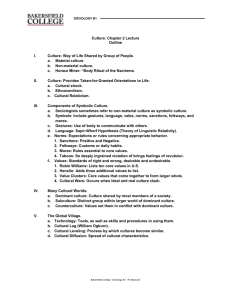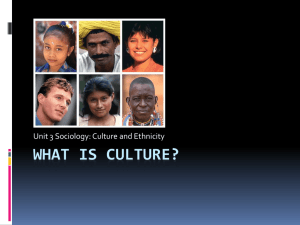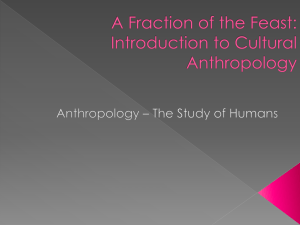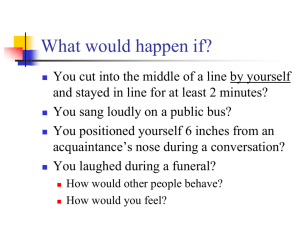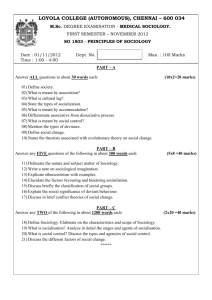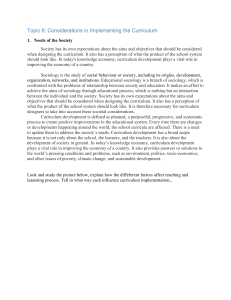LP 20 Symbolic Interactionism and Linguists as Cultural Reality
advertisement
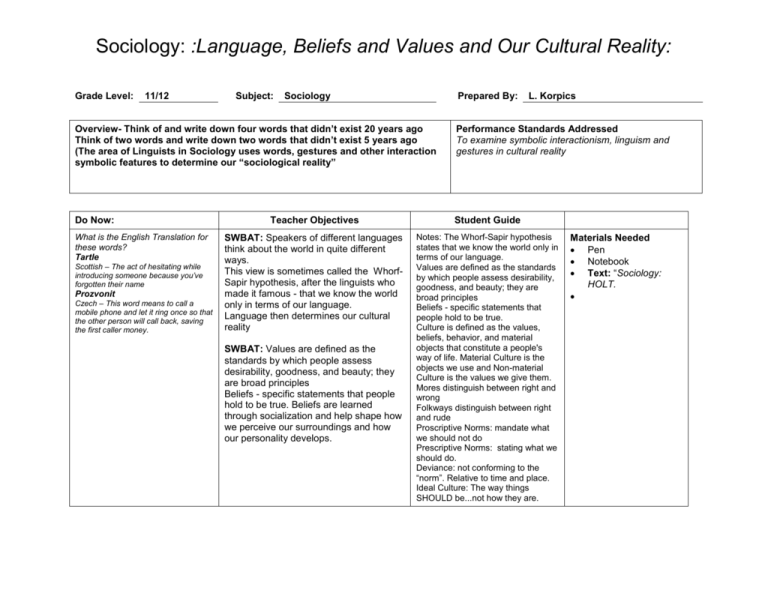
Sociology: :Language, Beliefs and Values and Our Cultural Reality: Grade Level: 11/12 Subject: Sociology Prepared By: L. Korpics Overview- Think of and write down four words that didn’t exist 20 years ago Think of two words and write down two words that didn’t exist 5 years ago (The area of Linguists in Sociology uses words, gestures and other interaction symbolic features to determine our “sociological reality” Performance Standards Addressed To examine symbolic interactionism, linguism and gestures in cultural reality Do Now: Teacher Objectives Student Guide SWBAT: Speakers of different languages think about the world in quite different ways. This view is sometimes called the WhorfSapir hypothesis, after the linguists who made it famous - that we know the world only in terms of our language. Language then determines our cultural reality Notes: The Whorf-Sapir hypothesis states that we know the world only in terms of our language. Values are defined as the standards by which people assess desirability, goodness, and beauty; they are broad principles Beliefs - specific statements that people hold to be true. Culture is defined as the values, beliefs, behavior, and material objects that constitute a people's way of life. Material Culture is the objects we use and Non-material Culture is the values we give them. Mores distinguish between right and wrong Folkways distinguish between right and rude Proscriptive Norms: mandate what we should not do Prescriptive Norms: stating what we should do. Deviance: not conforming to the “norm”. Relative to time and place. Ideal Culture: The way things SHOULD be...not how they are. What is the English Translation for these words? Tartle Scottish – The act of hesitating while introducing someone because you’ve forgotten their name Prozvonit Czech – This word means to call a mobile phone and let it ring once so that the other person will call back, saving the first caller money. SWBAT: Values are defined as the standards by which people assess desirability, goodness, and beauty; they are broad principles Beliefs - specific statements that people hold to be true. Beliefs are learned through socialization and help shape how we perceive our surroundings and how our personality develops. Materials Needed Pen Notebook Text: “Sociology: HOLT. Information I do: Notes on objectives (Give and/or demonstrate necessary information) We do: Verification (Steps to check for student understanding) Activity (Describe the independent activity to reinforce this lesson) They do: What was one belief you had that changed? What is one belief you have that hasn’t changed? If you were to choose one word to sum up your value system…what would it be? Independent: HW find an article that expresses material and nonmaterial culture 1. 2. 3. 4. Assessment: Quiz, Unit Exam, HW Article Assignment Inquiry – Discussion Sociologists describe two interrelated aspects of human culture: the physical objects of the culture (Material Culture) and the ideas associated with these objects. (Non-material Culture). Homework Due: Friday 9/9/11 Article: What is it Who are the individuals that would use these articles/constructs What groups are not included Think of 2 reasons not mentioned in the article for the possible reasons for these items in a latent fashion Exit Quiz HW Summary: Other Resources Smart Board/Computer/Photos

